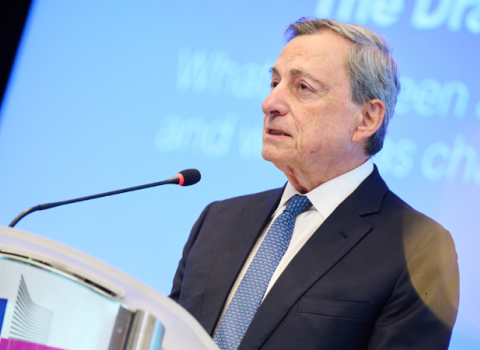Research ministers endorse a “self-standing” Framework Programme, but are silent on measures to close Europe’s research and innovation gap

Photo credits: European Union
EU research ministers have sent a strong signal that they want the next Framework Programme, FP10, to be a standalone research and innovation programme and not part of a broader European Competitiveness Fund.
Meeting in Warsaw on March 11, they instructed the European Commission to draft its proposal for FP10 “building on the legacy of self-standing Framework Programmes.” They also noted that the EU treaties specify that the Framework Programme should establish the scientific and technological objectives to be achieved and the amount of the EU’s financial participation.
According to Marcin Kulasek, Poland’s science minister, the Warsaw Declaration that emerged from the informal Council meeting is a “loud message from science ministers in the EU for a stable, intelligently-shaped Framework Programme for European scientists and innovators.”
“Without a strong Framework Programme, it’s going to be hard to raise the competitiveness of Europe, to build technological independence, and to support security,” he said, adding that science and innovation will be crucial to tackling future crises.
While research commissioner Ekaterina Zaharieva has spoken about the importance of the Framework Programmes, official Commission plans make no mention of preparing FP10, and the research community is growing increasingly worried there will not be a standalone programme beyond 2027.
“It was clear from today’s discussion [. . .] that member states consider that a strong and well-funded [Framework] Programme is essential for Europe’s competitiveness,” Zaharieva said following the meeting.
Meanwhile, as research ministers were meeting in Warsaw, MEPs in Strasbourg were adopting their recommendations for Horizon Europe’s successor, which they also say should be a “standalone” programme.
MEP Christian Ehler, rapporteur of the Parliament’s report, said he was “speechless” that the Commission’s directorate-general for budget appeared to be running a “secret operation” to integrate FP10 in the Competitiveness Fund without consulting Parliament or the Council.
Responding to questions from Science|Business, Ehler insisted that the Commission does not have the power to decide the fate of FP10 on its own. Seeking to go against its co-legislators could “endanger the whole operation” of a future long-term EU budget, he said.
Meanwhile, the Irish government added its voice to the debate, calling for a “ring-fenced” EU research budget in its preliminary position on FP10.
ERC independence
The Warsaw Declaration also urges the Commission to preserve the independence and expand the roles of the European Research Council (ERC) and the European Innovation Council (EIC). This drew a warm response from ERC president Maria Leptin, who thanked the ministers for their “strong support.”
Fears that the Commission could bypass the ERC’s independent scientific council and impose top-down priorities on the funder were fuelled by a statement in its Competitiveness Compass that the ERC should operate “along the same strategic interests” as the EIC.
Universities have also expressed concerns that the Commission’s competitiveness plans overlook the importance of basic research, which the ERC funds. Zaharieva, however, has insisted that support for fundamental research is “very strong” and present throughout Commission policy. “It’s in the political guidelines of our president, it’s in the Competitiveness Compass, in all reports,” she said.
When it comes to funding, the Warsaw Declaration calls for an “adequate budget” for FP10 “matching its strategic role, including strengthening European competitiveness and tackling global and societal challenges.” It further states that other EU programmes or instruments should not be funded at the expense of the Framework Programme.
Among other demands, the ministers want to see FP10 create new transnational research and innovation cooperation networks, help to retain and attract the best researchers “including reintegration of researchers back to the EU,” and provide space for risk-taking.
Difficult negotiations
While research stakeholders are pleased with the key messages in the Warsaw Declaration, there are also signs of division among EU governments. In order to reach a compromise, the final text was slimmed down compared to an early draft published by Science|Business.
The most significant disagreements, according to one diplomat, were over the language used in the reference to the FP10 budget. This was not down to research ministries, another diplomatic source said, but foreign and finance ministries, who were keen to ensure the declaration did not make recommendations beyond FP10 that might affect the architecture of the next long-term EU budget.
The future of the Widening programme also looks set to become a key battleground within the Council during FP10 talks. The first draft of the text, prepared by the Polish presidency of the Council, noted the need for “efforts towards decreasing the research and innovation gap within Europe,” but this is absent from the final version.
Some countries expressed regret over this omission during the meeting, but member states ultimately agreed that the priority was to send a clear message that there should be a standalone Framework Programme with an adequate budget.
This is not the first time the Council has taken a position on the future programme, but “in terms of timeliness, this was the most important initiative from the member states’ side,” the diplomat told Science|Business.
Other cuts during negotiations included references to the role of FP10 in cementing research and innovation as the “fifth freedom” of the single market, and to strengthening research cooperation with global partners. Specific references to “social and environmental technologies” and to civil security research also fell by the wayside.





 A unique international forum for public research organisations and companies to connect their external engagement with strategic interests around their R&D system.
A unique international forum for public research organisations and companies to connect their external engagement with strategic interests around their R&D system.